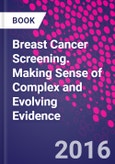This book provides balanced perspectives on this increasingly controversial topic, using scientific evidence to explain the evolution of knowledge relating to breast cancer screening. Breast Cancer Screening covers the key points related to this debate including the context of increasingly complex and conflicting evidence, divergent opinions on the benefits and harms of breast screening, and variability in screening practice and outcomes across settings around the world.
Please Note: This is an On Demand product, delivery may take up to 11 working days after payment has been received.
Table of Contents
1. Foreword: Breast Cancer Screening: A focus on the evidence 2. Breast Cancer Screening: balancing evidence with culture, politics, money, and media 3. Estimates of Screening Benefit: The Randomized Trials of Breast Cancer Screening 4. Weighing the benefits and harms: Screening mammography in the balance 5. The Importance of Observational Evidence to Estimate and Monitor Mortality Reduction from Current Breast Cancer Screening 6. The role of microsimulation modeling in evaluating the outcomes and effect of screening 7. Challenges in understanding and quantifying over-diagnosis and over-treatment 8. Challenges and opportunities in the implementation of risk-based screening for breast cancer 9. Breast Cancer Screening in the Older Woman 10. Screening Women in their Forties 11. Screening for Breast Cancer in Women with Dense Breasts 12. Screening women with known or suspected cancer gene mutations 13. Imaging Surveillance of Women with a Personal History of Breast Cancer 14. Evolution of mammography screening: from film screen to digital breast tomosynthesis 15. Ethical and Societal Considerations in Breast Cancer Screening 16. Treatment of screen-detected breast cancer: can we avoid or minimize over-treatment? 17. Informed and shared decision-making in breast screening








